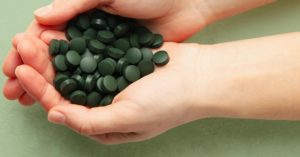Headquartered in Ontario, Canada, Algae-C is using algae as a biomanufacturing platform to produce key ingredients for the pharmaceutical and other industries, as well as biomass that is valuable for feed, food and energy markets. It is a breakthrough approach that brings together the unique biological advantages of algae with the diversity of production capacity in the expanding global algae industry.
A new kind of flexibility, and precision, for pharmaceutical production
Last year, Algae-C joined the Algae Biomass Organization as a Bronze member, a new membership category for companies preparing to make big impacts in algae and seaweed markets. Today, Algae-C is ready to make its impact, and is currently targeting the multi-billion dollar market for plant-based active pharmaceutical ingredients (APIs).
APIs often have to be made with expensive and time-consuming chemical synthesis. In many cases, they are only available from a few international sources, making them vulnerable to the supply chain disruptions that have recently been on the rise due to political uncertainty, the COVID-19 pandemic, economic slowdowns and regional conflicts.
Algae-C’s technology addresses these challenges with its ability to reprogram algae to create designer strains that can produce high-value, plant-based API’s. It’s a process that can be done economically, sustainably, and anywhere in the world.
The company’s approach starts with identifying which genes in a plant are responsible for producing a specific molecule , such as a pharmaceutical ingredient. Those genes are then inserted into a strain of algae, which is consequently grown under careful conditions and monitored for quality and stability.
The algae are then allowed to grow, creating biomass that contains the target molecule. Once the required volume of biomass is reached the algae are harvested and the target molecule can be extracted, purified and prepared for delivery.
“Our approach uses the best of current algae production methods and modern synthetic biology techniques in a single platform to produce high value molecules,” said Dr. Mather Carscallen, chief executive officer of Algae-C. “With this approach, we can address many of the bottlenecks that all too often limit API manufacturing.”
In fact, the molecules produced aren’t limited to APIs for the pharmaceutical industry, but can also be utilized in the personal care, nutritional, and many other markets. There are even novel molecules never before seen that this technology could quickly bring to mass production.
The high purity and customization that is possible puts the Algae-C process at a clear advantage over many current chemical synthesis techniques, especially when it is combined with the low-cost and sustainable production aspects of algae cultivation.
Why algae are particularly well suited for pharmaceutical production
Algae have some unique advantages over other organisms like terrestrial crops, or even other microorganisms, when it comes to using synthetic biology in chemical production. Perhaps one of the largest comes from algae’s natural ability to produce high-value molecules: They require up to 85% fewer modifications in comparison to yeast or bacteria when the target molecule is plant-based.
When it comes to inputs like water and nutrient supplies, algae have the flexibility needed to be deployed in almost any location in the world. And since algae can absorb carbon dioxide as they grow, rather than produce it like many yeast and bacteria, they can fit more easily into supply chains that are under tremendous pressure to decarbonize.
Algae-C lists a number of the advantages of their technology for API production:
- 95% reduction in production cost (avg.)
- Consistent, high quality yields
- Faster development of new molecules
- 90% lower environmental footprint
- 99% water recycling
- CO2 sequestration from the atmosphere
- Zero waste with biomass reuse or recycling
A Platform That Offers New Opportunities for Algae Producers
The model that Algae-C is using for commercialization involves building partnerships with algae producers worldwide These partners have found that Algae-C’s methods and strains can be quickly adapted to a wide range of bioreactor or outdoor algae cultivation operations.
This partnership model means that Algae-C is not positioning itself for vertical integration, but instead seeks to leverage the expertise and infrastructure that is already in place in the global algae community. They achieve this by breaking down their market strategy into a few simple steps.
- Identify a product: Algae-C’s staff and customers identify novel or existing molecules of interest, with special attention on those that are plant-based. They also confirm the market for the molecule as well as efficacy studies about its potential.
- Confirm the biology: Algae-C’s R&D team then transforms an algae strain to produce the target molecule. Testing is conducted to confirm that as an algae culture grows the production of the target molecule expands.
- Coordinate commercial production: Algae-C works with its partner algae cultivators to confirm that the volumes produced can meet the relevant commercial scale. This can be anything from a few kilograms to tons of biomass.
- Deliver a product: Algae-C’s partners with local access to the relevant market begin production. The extracted high-value molecules are made available to pharmaceutical partners, and biomass that remains from the extraction process can be sold into markets for animal feed, fertilizers or other established markets.
A platform technology can be a force multiplier for accelerating the growth of the algae industry
This platform technology approach has great potential when it comes to boosting the broader algae industry. Algae-C’s model can ensure that a production base, or any single producer, is never overextended. Collaborations ensure that the production of a particular molecule can be quickly and reliably achieved with an economic and sustainable profile that is ahead of other methods. The ability of Algae-C’s partners to take advantage of additional revenue streams that come with marketing the leftover biomass offers another market pull for more investments in production capacity.
As Algae-C and other synbio companies use algae to deliver more products, those algae producers that are deploying photobioreactors, open ponds and fermentation methods will find more opportunities. It may be a landmark step in the journey that advanced algae technologies are on as they become mainstream production methods for a new generation of sustainable products.
Learn more about Algae-C at: https://algae-c.com/our-technology/
Photo by Atlas – stock.adobe.com





